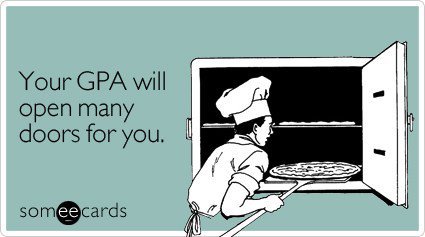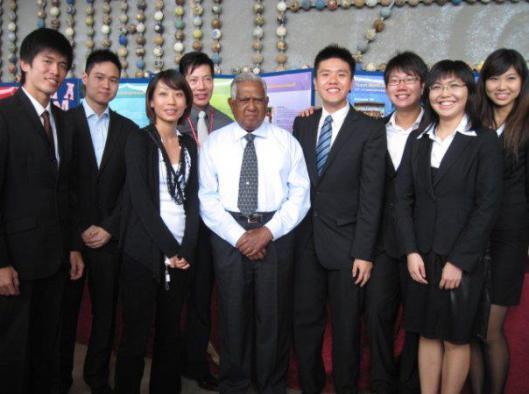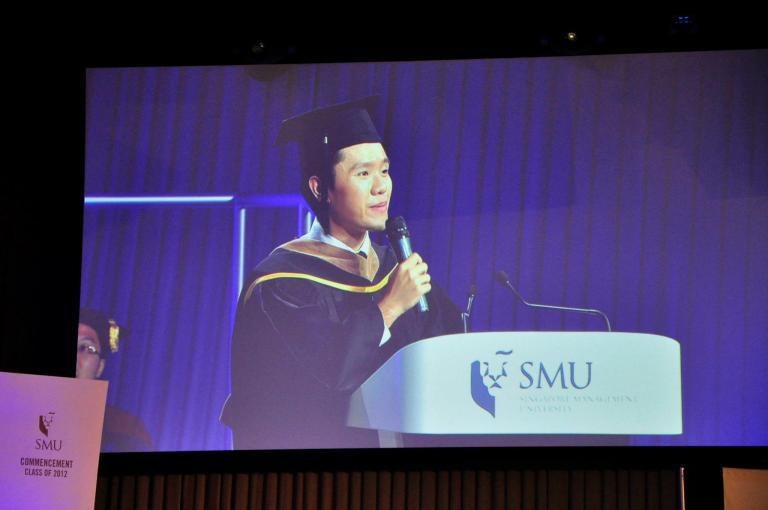

This was the result from my first semester’s academic transcript in my first year of university.
When I received my first C- in my academic life as an undergraduate, I was awfully disappointed. But in looking back, I always thought it was one of the best things that had happened to me.
Let me tell you why.
Today, I had a meeting with a faculty member from my alma mater, SMU. I had reached out to him because of the research he was doing and how it fits squarely with my work around ‘Millennials’. As we chatted, we invariably spoke about the current batch of undergraduates and their unique quirks.

He recounted to me that the current batch of students he teaches are increasingly focused on the outcomes of learning (i.e. the grades) rather than the process of it. To be fair, the Grade Point Average (GPA) is still one of the most objective benchmarks of your achievement in your four years in university.
But as I dug further, he went on to share with me that the biggest point of contentions often come when students are missing that 1% to get to the next grade scale (like A to A+, B+ to A-). Granted that he teaches a module that is more subjective in nature rather than Finance or Accounting where marks tend to be absolute, he often has students lining up to meet him to find ways and means to negotiate for the “1% bump”.
Sometimes, he grants them the mark revision, but only if it’s justified. On most other occasions, he doesn’t because in his professional opinion, it just doesn’t make sense to give you that additional percentage point just to boost your grade! At this juncture, he shares that his students either become entirely distraught and break down in tears because they think they are not good enough; or they become antagonistic because they feel they deserve the better grade.
When I heard that, I was honestly flabbergasted. I understand that everyone has their unique situations and challenges—like maintaining their GPA to hold on to their scholarships, vying for jobs to bring income to their family etc. But when it borders on having those numbers define your identity and worth, I think it really isn’t justified or worth it. Repeatedly in my academic life, I have told myself,
“Ben, you are not to be defined by your assignments or exams or GPA. You are bigger than that”
Call it my coping (or escaping) mechanism or maybe it’s just my excuse for not doing enough of my accounting assignments. But I always thought the value of an education transcends the grades that you get. One of my earliest blog posts on my university stint says exactly that.
On hindsight, I think what gave me this self-belief and optimism was really getting my first C-.
You see, if there’s something I’ve learnt about the GPA game—which I should have learnt much earlier on—it only takes one C or D grade to foil your entire grade endeavour. It’s like stepping onto a landmine—you’re doomed (in the academic context) in that very instant, no matter what else you do.
Unfortunately, I learnt this lesson only after I got my first C-.
At that point, I was distraught. I was, after all, in a really competitive environment where my classmates’ disappointments were about getting A minuses and As! The peer pressure was intense and immense. It also dawned on me that being an accounting student and having a C- for my first accounting module didn’t bode well for my career…if there was to be one. You get the drift.
The strange thing is I didn’t find myself depressed for long.
In fact, that C- slapped me in the face and got me to wake up over the subsequent semesters. To be honest, I tried to work harder to pull up my GPA and it did, to a limited extent. But more and more, I began to realise that accounting and numbers didn’t come to me easily. It was really difficult and I had to force myself to stay awake during the advanced accounting classes.
When I took on my mandatory taxation internship, I found that the work just didn’t call out to me. I was bored, disengaged and even “outsourced” my work to a fellow intern who happily took on my share of work. Thank you, Jean. I couldn’t have survived without those “mandatory” 15-minutes post-lunch nap each workday.
Being quite the optimist (or rather a realist), I realised that maybe getting that C- in my first semester wasn’t a bad thing after all. It gave me feedback on what wasn’t working. And getting low Bs and Cs even after I put in more work and effort were even more defining clues and signs. I even got, not one, but two D+ towards the later part of my academic journey! It was then that I realised if the GPA game was screwed henceforth for me, why didn’t I just try out the other “games” in life? It gave me the permission to do things I had feared trying. As a result, it liberated me.

A photo opportunity with then-President of Singapore, S R Nathan and my team as we won a social venture competition.
I realised early on that if my real gifts and talents didn’t lie in counting beans, maybe I should discover what I truly love doing. One thing led to another and I ended up with 6 different internships and joining over 30 competitions during my university life. I launched community projects, went on an exchange to Seoul, and found my life partner. I asked my professors out for coffee and meals to connect with them and made lasting relationships and friendships. And most importantly, it was in the process of doing so many things that I found how much I loved being able to impact lives through education. Specifically, in training and coaching people
Looking back, I think that if I were a straight A student, I probably would have been more compelled to maintain my GPA and have less incentive to push the envelope. I would have stayed in the zones of comfort and certainty, rather than push the door of the “unknown” (some say, stupidity) to discover my true playground where passion resided for me.
So it does sound like a case where hindsight is 20/20. But I realise that we always have a choice of perspective in every scenario—good or bad. Maybe I was influenced enough by Victor Frankl after reading his book, ‘Man’s Search for Meaning’,
“When we are no longer able to change a situation, we are challenged to change ourselves.” – Victor E. Frankl
You might say that I was being irresponsible to my parents since they were sponsoring my education. But to assure you, I did tell my parents I would not drop out from school and would gift them with my graduation certificate as a mark of my discipline and responsibility to them. And I did.
However, I think the best thing I did in my four years of university was to make use of this process to discover myself. To hear myself without the incessant noise of competition all around. To trust in myself to find out what truly matters to me in my life and do something that I would be great at and can be proud of.
Because I know when all of that happens, I would then be able to shine and that’s when my parents will be truly proud of me.
I’m not telling you that you should go out there and flunk your exams; or that you should be in a state of denial if you do get Bs, Cs or Ds for your grades. I am telling you that grades are important but do not define your talents, gifts, capabilities, worth and identity. So don’t be lured into a false sense of superiority if you’re an A+ student or think you’re inferior to others if you end up with Cs and Ds.

Didn’t do well enough to go up stage to get academic awards so I got the next best job, which is, to host our Commencement Ceremony.
Thankfully with sheer grit and support from my mentors and sponsors, things have turned out just fine for me. And now, as I review my academic transcript again, the C- was truly one of the best things that has ever happened to me


